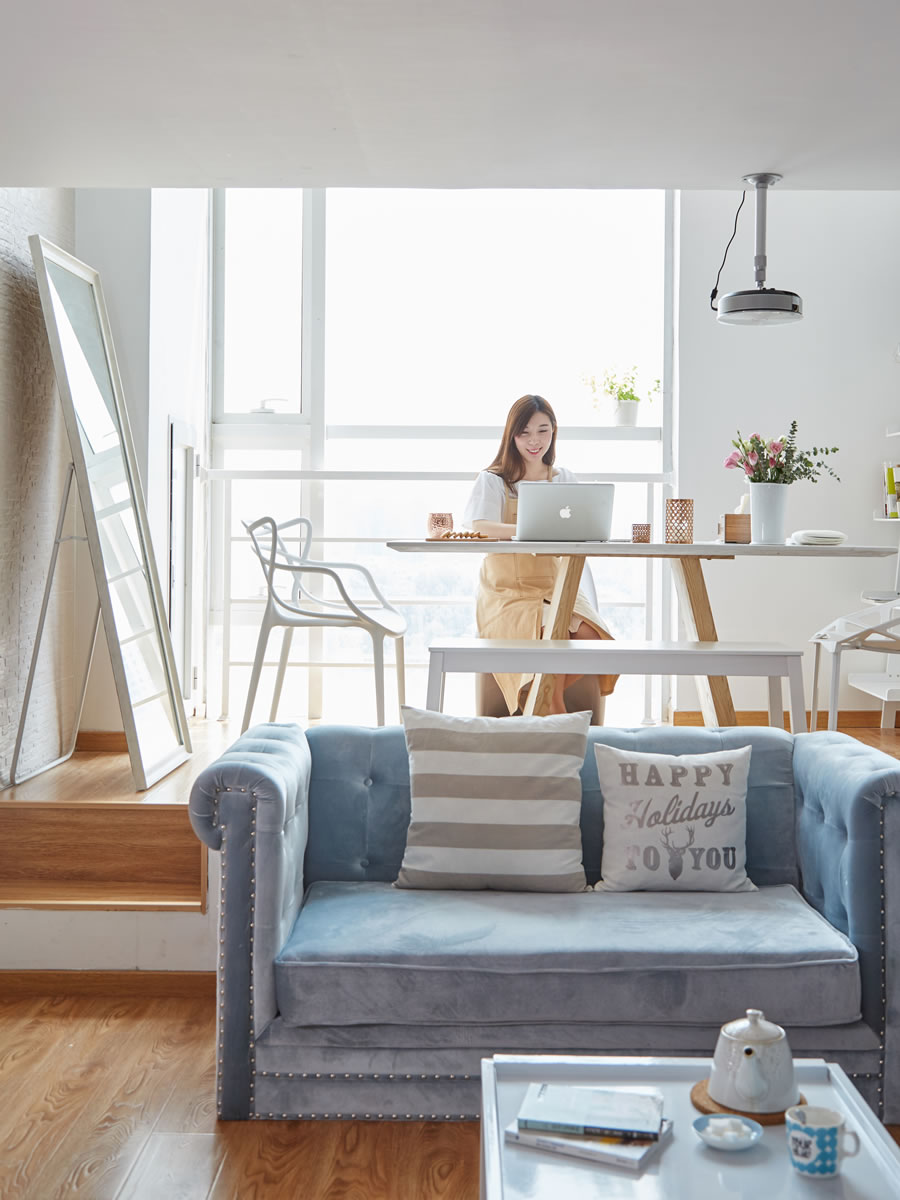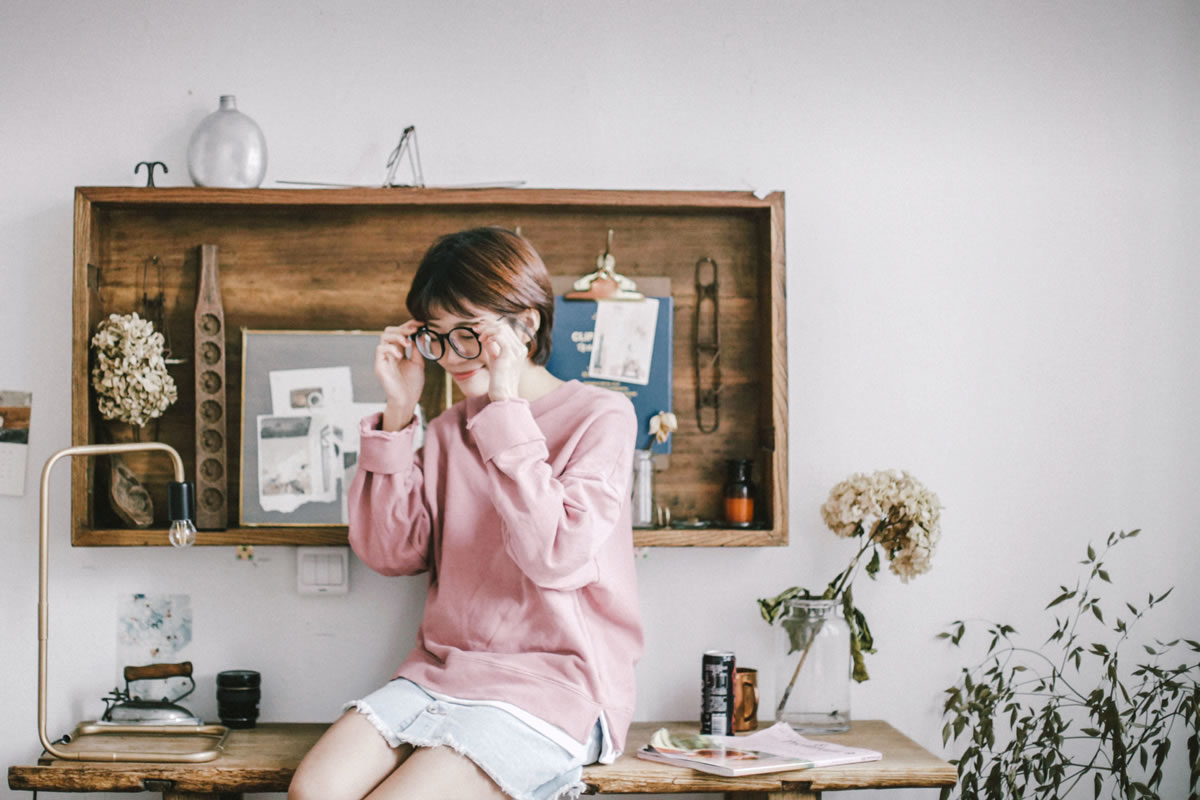1. 告訴我們關於你自己,你的民宿,你是誰,還有你從哪裏來!
Hi,我是Ivy ,姓薛,在很認真的地方署名 Ivy Xue。會去嘗試很多事情,並帶著這些經歷去思考,然後再去嘗試。把所有的有趣的事情結合起來,欣賞火花碰撞迸發出來的效果,我就覺得超滿足。喜歡旅行,喜歡設計,現在是獨立設計師兼 Inner Home 品牌主理人。
我的民宿也是 Inner Home 品牌很重要的一部分,現在可以看到的叫做 “Inner Home Hostel @Qingdao”,它在青島,最市井的老城區。幾十年前曾經日本人建立了這條街區,把它設立為青島最初的商業中心“市場三路”。帶著德國人和日本人遺留的痕跡,又經歷了城市交通樞紐的新型規劃,這條街道仿佛時間就定格在90年代了。
我主要生活在北京,但青島是我放松的後花園,每當北京的快節奏壓的我有些緊迫,回到青島面對大海透一口氣,很是清新。這種“雙城生活”格外有趣。
2. 在開民宿之前,你在做什麼?
所有的經歷是為了讓我想清楚,我是誰、我擁有什麽、我需要什麽、我即將面對什麽。
09-12年我在北京媒體任職,做過時裝編輯、Stylist。策劃過大型的頒獎典禮、慈善晚宴、藝術展覽。然後在事業感覺順風順水的時候,2012年我跑去了美國讀了一個和自己職業規劃沒有關系的公共管理碩士。在美國、加拿大各地旅行,一個人在沙漠裏開車,深夜去山裏紮營為了拍攝星雲。為了看北密的楓葉,在路上偶遇小動物出車禍。好多事情在那幾年發生,然後我就想明白了一個道理。以前的生活是為“別人”而活的,是假的。以後我想要為自己的開心而活。在生活裏尋找讓我有興趣並快樂的事成為了我要做的。
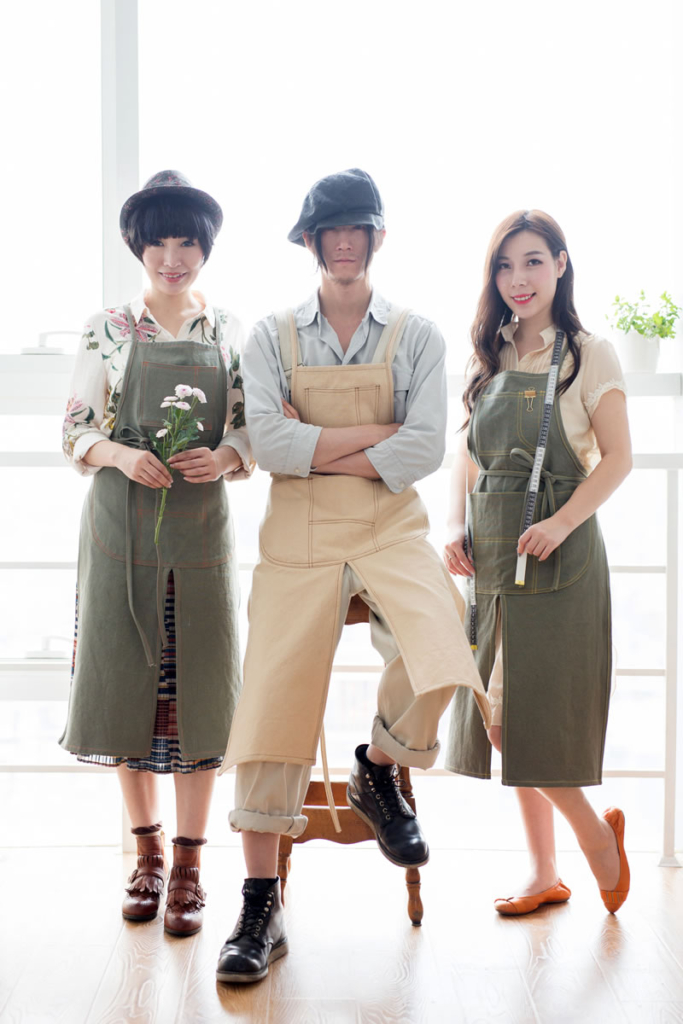 花藝師夕小樓,咖啡師Clark,和 Ivy(上)
花藝師夕小樓,咖啡師Clark,和 Ivy(上)
3. 是什麼讓你決定開民宿?告訴我們一切的開始!
2015年我回國後創立了 Inner Home 品牌,自己做起了設計師,設計女性睡衣和家居服。又在這個方向上,和咖啡師 Clark、花藝師夕小樓共同合作設計了 Inditude 工裝圍裙。在創作和尋找產品的意義的過程中,我發現更多人欣賞和喜歡的是,為他們提供的舒適的空間感和精致的設計。產品只是所有代表我的個人審美的一部分,那麽什麽才能表現整體呢?我思考了一段時間。
後來,我做了一個大膽的決定,就是把我在北京的設計工作室放到了 Airbnb 上,整個空間的陳列、審美,以及小件物品和細節的選擇,都能代表著房屋主人的心思和品位。陸續而來的客人給了我更多的信心,從大家的評價中,我找到了認同感。更多的品牌和電影、電視劇劇組也紛紛與我聯絡,我知道,原來把自己的空間審美分享給其他人,也是一件非常有樂趣的事。
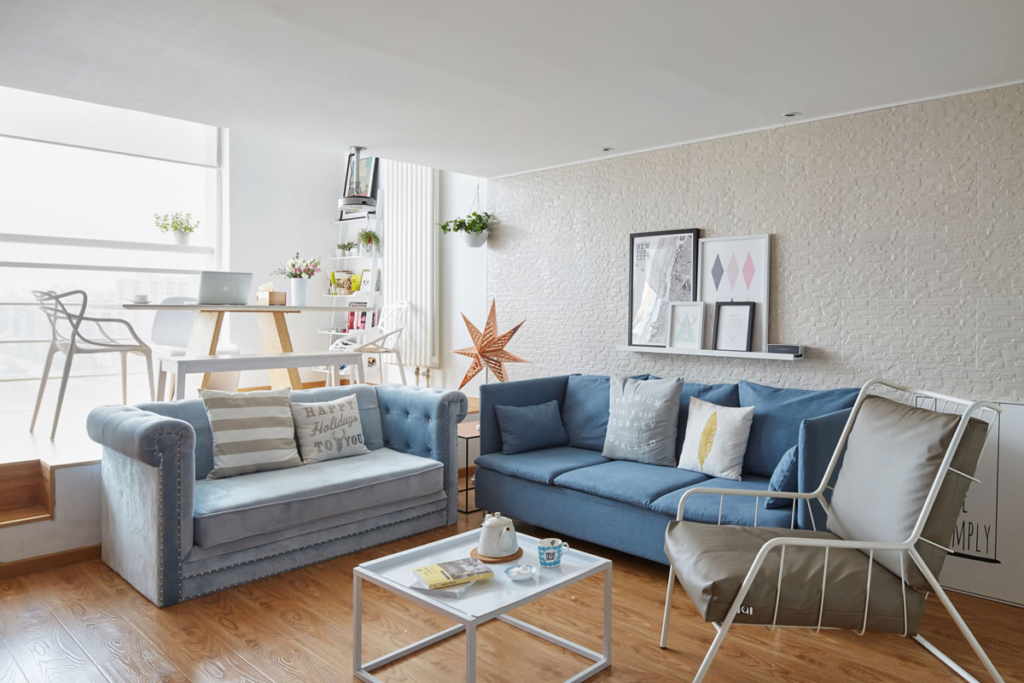
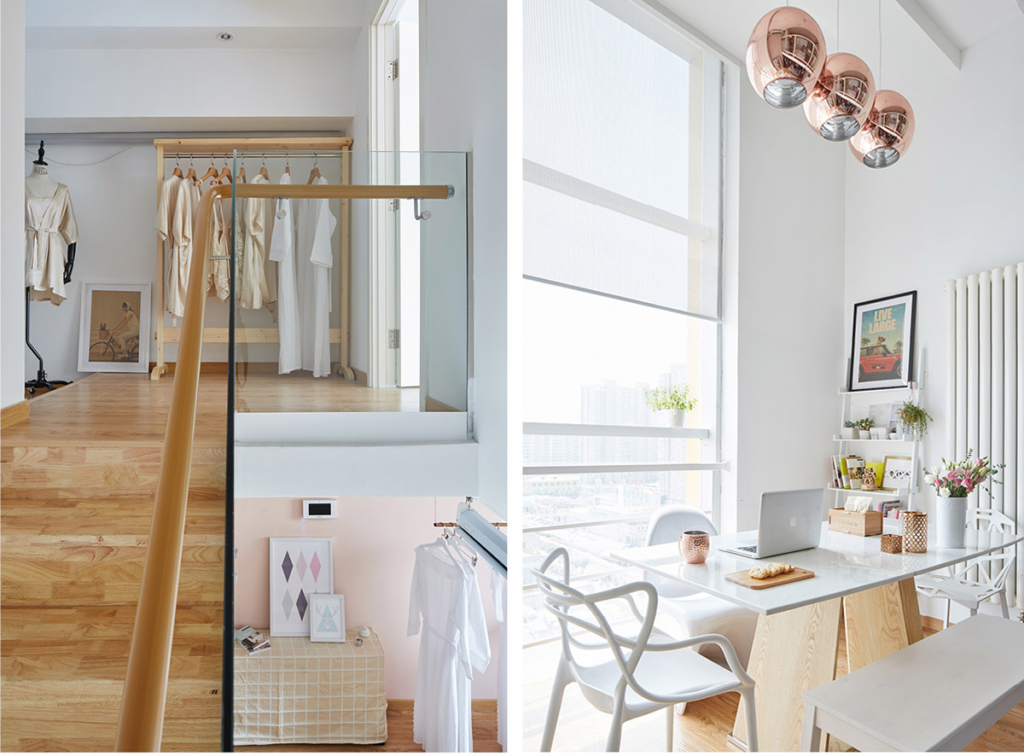 北京民宿 (上)
北京民宿 (上)
2016年,我決定在青島——這座帶著海派味道的海邊城市,開始第一家可以讓客人們同時享用環境又不影響彼此的民宿 Inner Home Hostel @Qingdao。
4. 是否能跟我們介紹民宿的空間?
80年代老房子改造。樓層位於2層,我自己增設了家用液壓電梯而代替原本長長的樓梯。一層是獨立入戶大門和電梯入口。共有6個房間,房型各有不同。家庭房、大床房、雙床房和女生宿舍。房型的豐富性為了滿足不同的旅行者需求。客廳休息區、開放式廚房、洗衣房等為共享區。大家可以坐在客廳用藍牙音響收聽自己喜歡的音樂,也可以在閱讀角借閱房東Ivy也就是我精選的書籍和獨立雜誌。《LOST》也作為主要推薦在陳列區。當然、開放式廚房不僅可以讓旅行者隨心所欲施展廚藝,也可以沖泡咖啡,我有提供新鮮的咖啡豆供客人享用。所有的設施都是為了讓旅行在外的人有家的感覺。記得日本建築師浦一也說,“旅行從客房開始”,我非常認同。
民宿整體的設計和搭配都是由我一個人負責,在老房改造的過程中,確實有很多艱難的挑戰,采光、通風、取暖、空調。有一些是無法與公寓房媲美的方面,但在我的爭取和努力下,也是做到了我心中的要求。整體顏色以白色、黃色和灰色為主色。很多客人都覺得很少女,也許是我本人還不願意長大吧,內心還留著少女的情懷~
5. 為什麼會選擇在這些地點開民宿?周圍有什麼特別的嗎?
青島這座城市,老城區和新城區感受非常明顯。我並不想在老城區建立了一個都帶有濃重的商業化氣息的店面。霓虹燈箱或者彩色噴繪都不是我要的,低調一些可能更有味道。選擇在這條曾經繁華的商業街區,現在都是老鄰居幾十年不曾改變的住宅作為民宿地點,是想讓更多的旅行者,看到青島本地人的生活方式。簡樸、隨意、有一些吵鬧、有一點悠閑。
交通便利也是一大優勢了。各種公交地鐵線路的開通、距離青島站不到1.5km。很多客人下了高鐵散散步就到了民宿,晚上走走逛逛就又到了棧橋海邊。海風配海景,都是美色。
6. 平常來住你們民宿有哪些人?
喜歡設計的年輕情侶、夫妻。獨自旅行的女生。成群結伴畢業旅行的學生們。我喜歡和他們聊天,因為房間多,有公共客廳休息區,客人們彼此也會結伴、聊天。旅行的意義不也在於此嘛。
7. 民宿開了多長時間?在這段時間裏領悟到了什麼?
北京的工作室做 Airbnb 有1年,青島的民宿也有半年了。最初做是當成興趣,現在是真的把這個當作服務和生意來經營了。用心去填補不足,找到解決的辦法,也學著和各種各樣的客人溝通。也有過爭議和麻煩,但都順利解決,希望理解可以更多。我們體諒客人的需求,也希望可以被更多客人認可。我也會繼續努力做好。
8. 是什麼讓你一直堅持做民宿?
是客人的表揚吧。看到那麽多人對你設計的風格喜歡、看到你用了小心思的物件。就會開心。還有就是可以和不同人聊天,能與經歷背景不同的人聊天,並且有共同話題這種事是多麽難得,可是我卻擁有好多好多難得的客人。我們可以聊設計、聊未來的旅行計劃、聊音樂、甚至聊對婚姻愛情的看法。好像有的故事只能和陌生人分享,放松又不拘泥。我想我的民宿做成了活的“樹洞”。😄
9. 做民宿是希望達到什麼願望嗎?
要說願望,其實是可以用民宿的盈利幫助我實現我做設計的夢想。設計好的產品需要更多的渠道和推廣運營。單一個人的力量很難達到。我希望我可以積蓄力量去發展 Inner Home。哈哈哈哈!
10. 對民宿的將來,你會有什麼打算?
還是希望在北京開一家民宿,不僅僅是民宿,而是一個集合空間。有民宿、有咖啡、有我設計的服裝、家居產品。將來那麽遠,先做好腳下的第一步。民宿,只是一個開始。

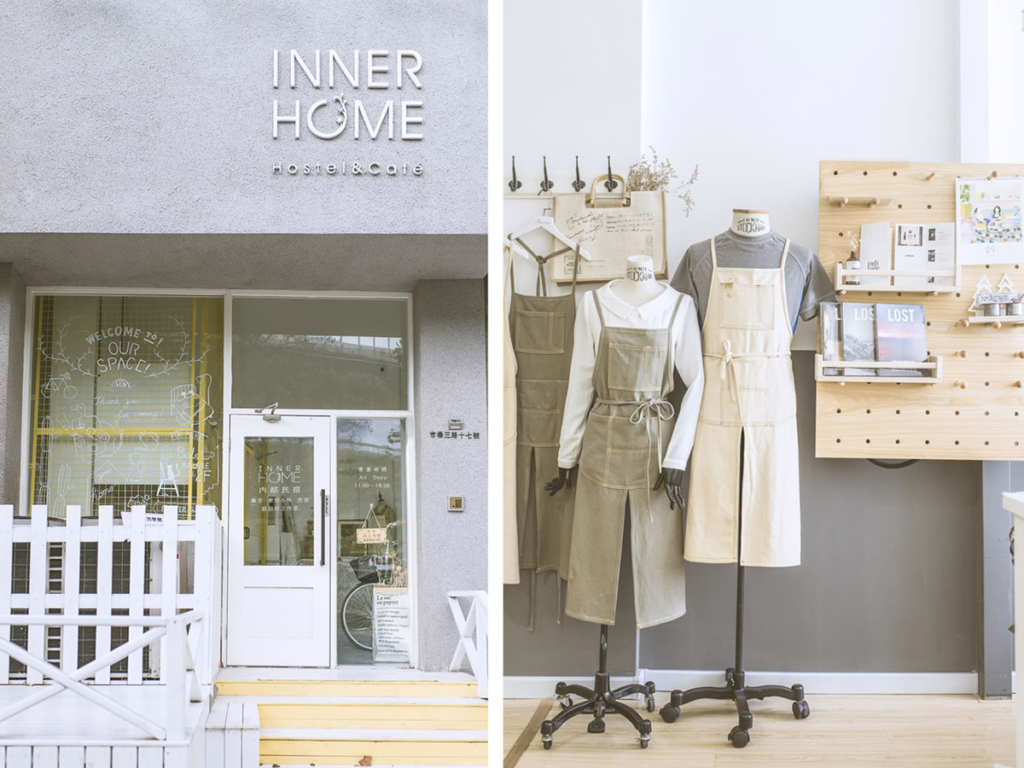
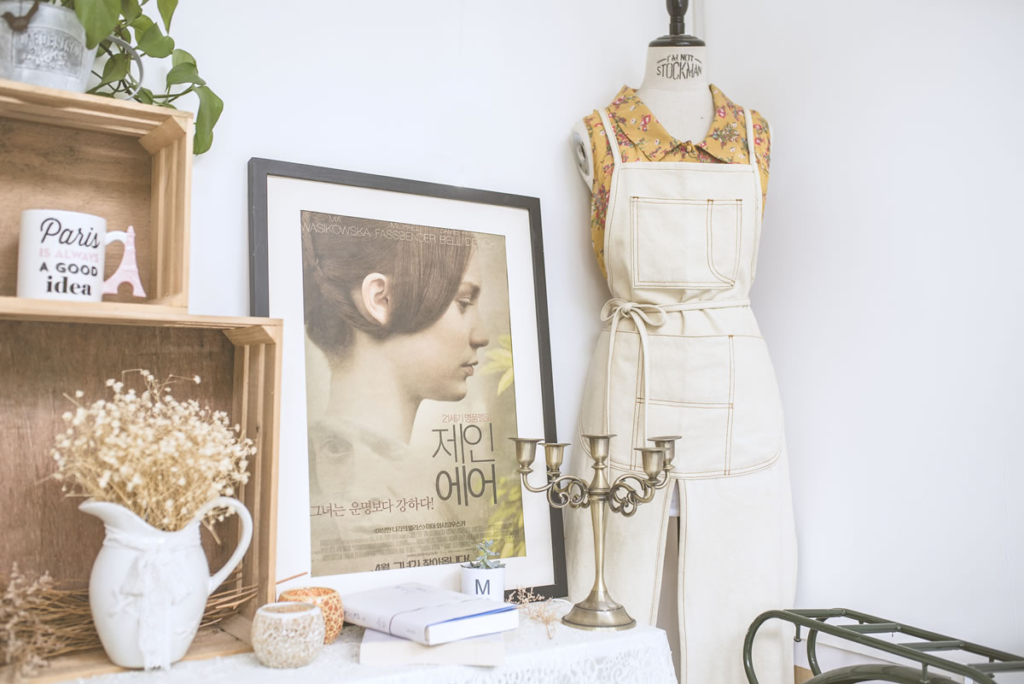
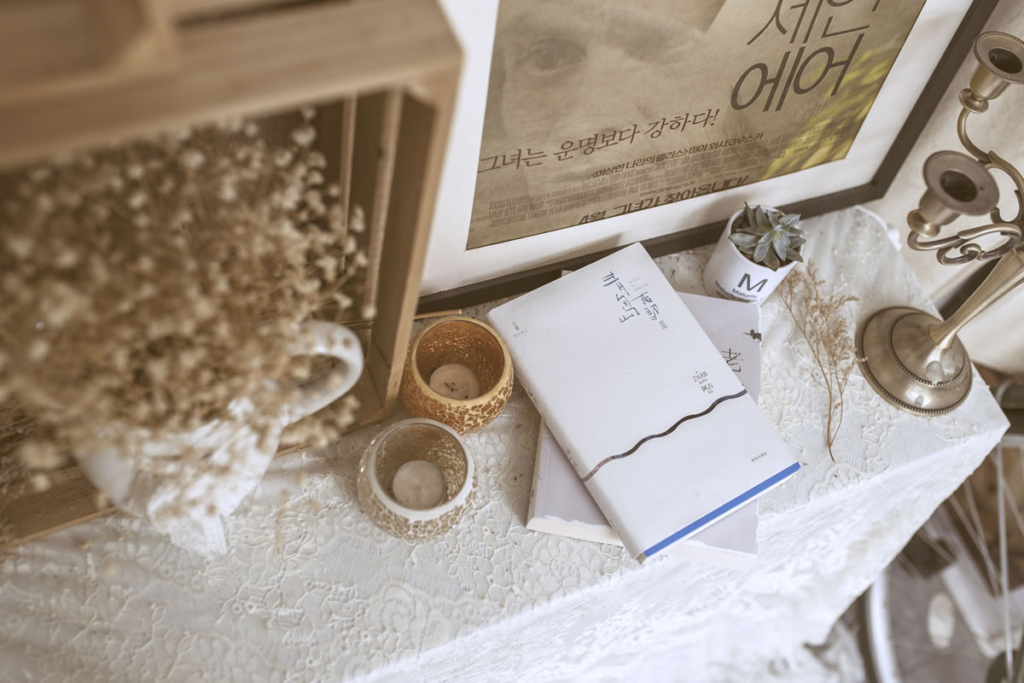
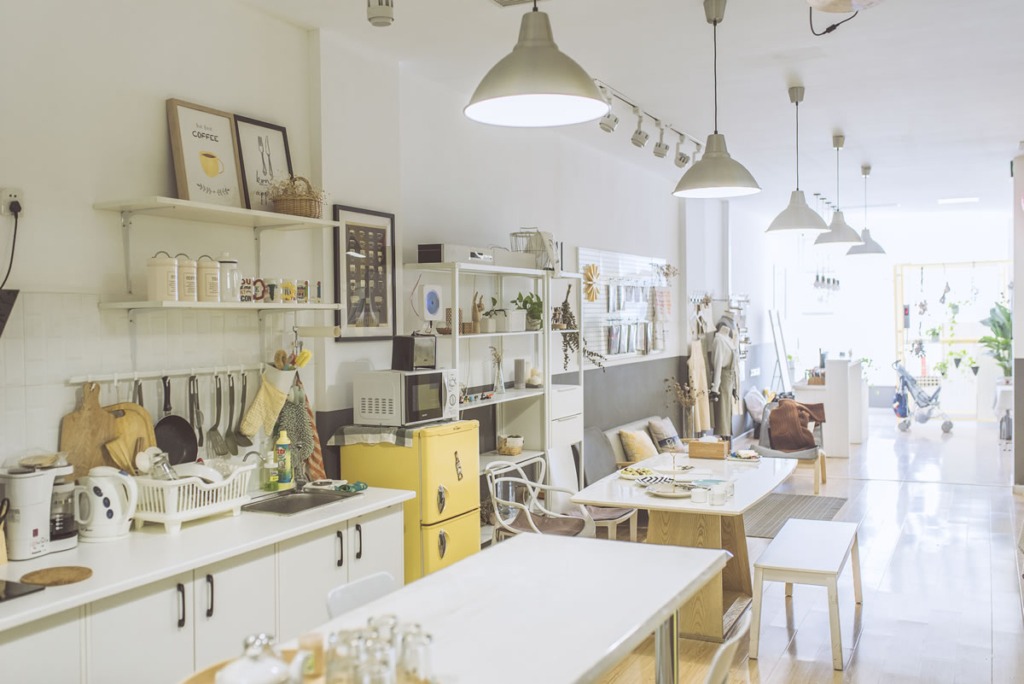
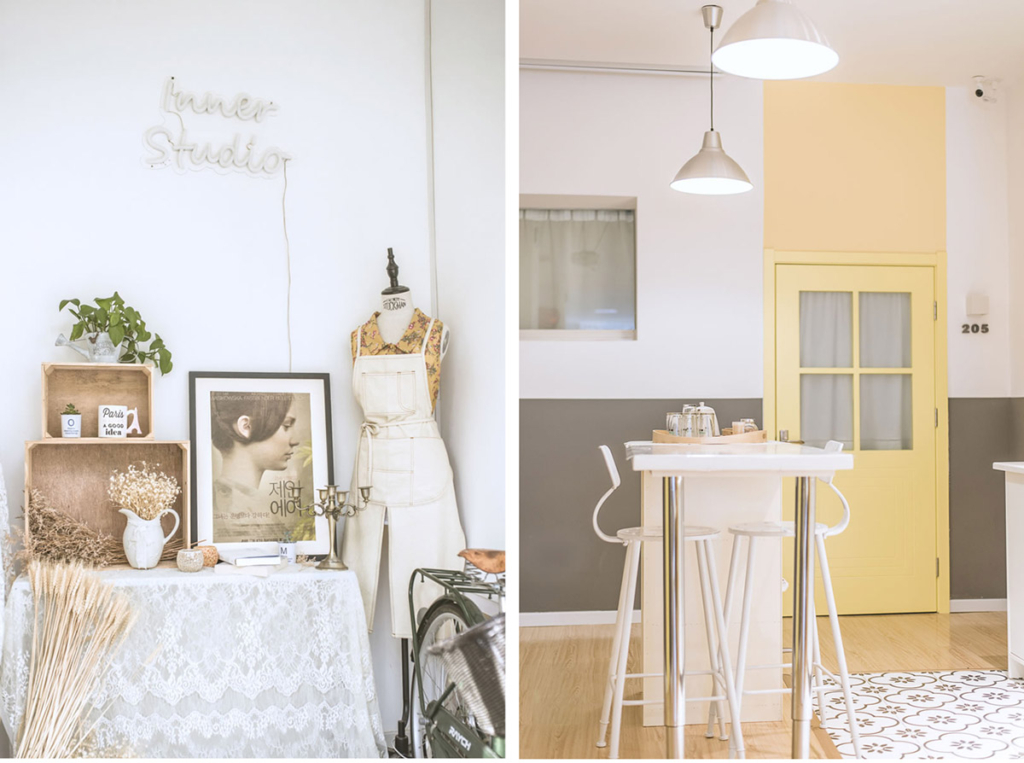
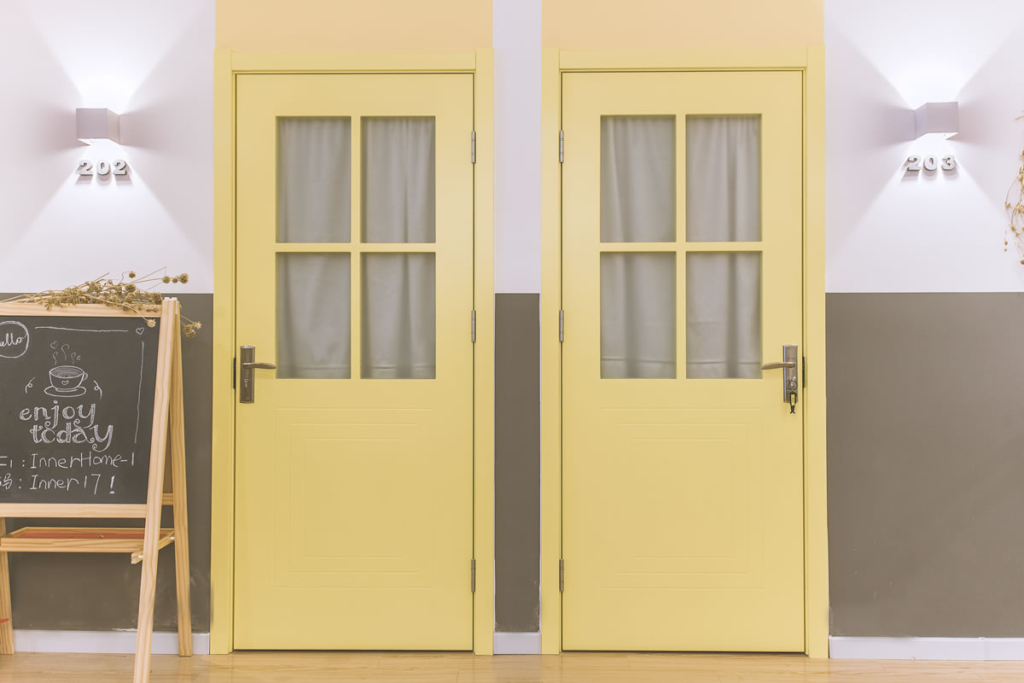
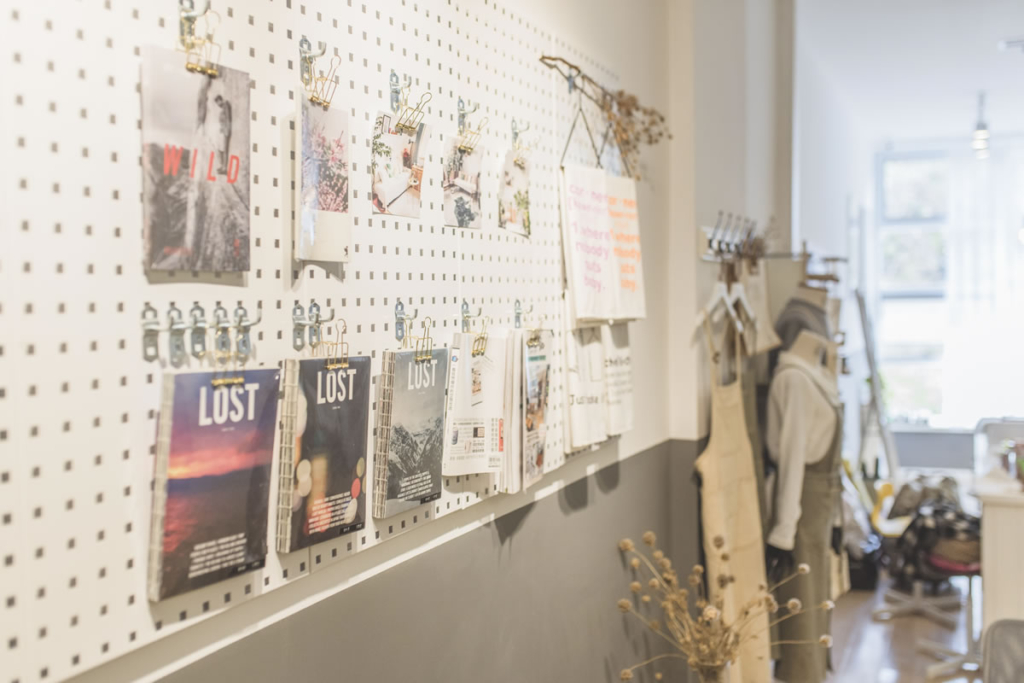 Qingdao hostel (above)
Qingdao hostel (above)
1. Tell us about yourself, your hostel, who you are and where you’re from!
Hi, I’m Ivy Xue. I love to try all sorts of things, and then take all these experiences into my head, and then try again. I love to combine all sorts of interesting things, and see what happens when they collide. I love travel, design, and am currently an independent designer while also the brand manager of Inner Home.
My hostel is also an important part of Inner Home. Right now, there is “Inner Home Hostel@Qingdao”, situated in the most marketable old street of Qingdao. Many decades ago, the Japanese built this area, and turned it into Qingdao’s commercial centre “Shichang San Lu”. Combining traces left behind by the Japanese and German, and undergoing new urban developments as a transport hub, this street seems to have frozen in time in the 90s.
I mostly live in Beijing, but Qingdao is the place where I go to relax. Whenever I feel stressed by the fast pace of Beijing, I will go back to Qingdao to face the calming sea. This type of dual-city life is especially interesting.
2. What were you doing before opening the hostel?
All my experiences are there to help me think clearly who I am, what I have, what I need, and what I will eventually face.
Between 2009~2012, I was working as fashion editor and stylist at a media company in Beijing. I’ve had to organize large-scale award ceremonies, charity dinners, and art exhibitions. And just when my career was smooth-sailing, I ran off to the US to study something completely unrelated to my career: a Masters in Public Administration. In the US and Canada, I travelled often; I’ve driven alone in the desert, even camped overnight in the mountains to photograph the stars. On my drive up to see the maple leaves, I ran into some small animals and almost had an accident. Many things happened in those few years, and I eventually understood something. The life that I used to have was fake, because I lived for “other people”. From then on I wanted to live for my own happiness. Finding the things in life that interest and excite me was what I needed to do.
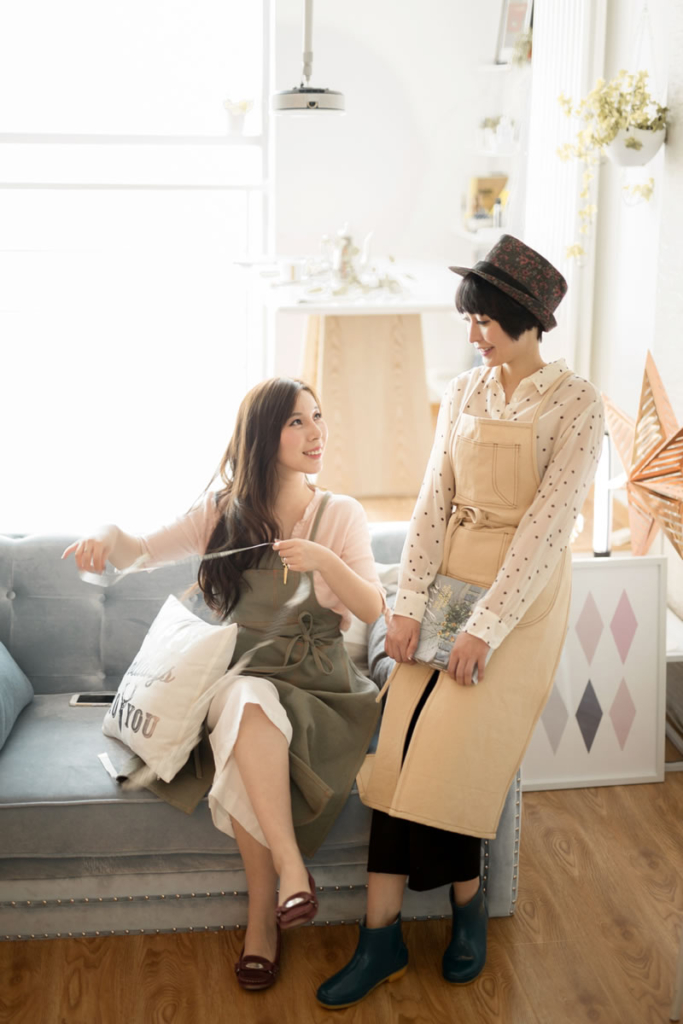
3. What made you decide to open a hostel? Tell us how everything began!
In 2015, I went back to China to start the Inner Home brand. I became a designer, and began designing pajamas and home apparel. During this time, I worked with Clark (a barista) and Xi Xiaolou (a florist) to create a work apron called Inditude. During the process of concepting and figuring out the meaning of the product, I realized more people appreciated the comfortable sense of space and exquisite design that was being presented to them. The product only represented a small part of my personal aesthetic, was there something else that could express my aesthetic more completely? I pondered over this for a period of time.
Later on, I made a bold decision to put my Beijing workspace up on Airbnb. The arrangement, display, aesthetic and choices of small items and details of the workspace expressed the owner’s ideas and tastes. The guests who came by gave me confidence, and I found affirmation from everyone’s comments. Brands, movie and TV drama crews contacted me and I soon learned it was such a wonderful thing to share your own space and sense of aesthetic to the world.
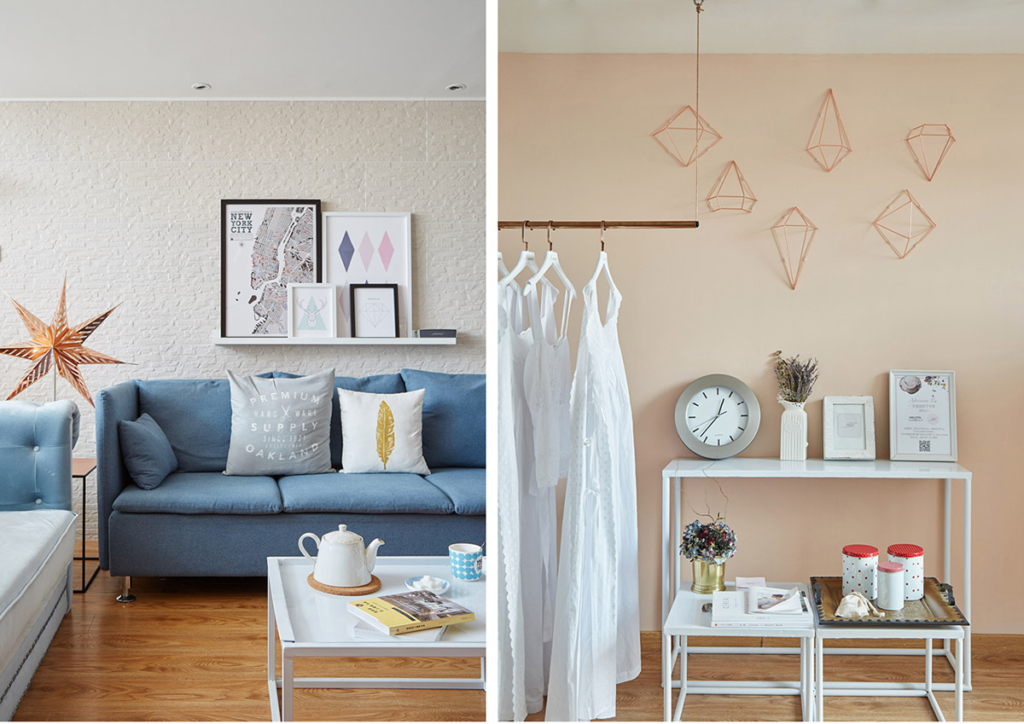 Beijing workspace (above)
Beijing workspace (above)
In 2016, I decided to open a hostel where guests can enjoy using the space freely in the seaside city of Qingdao: “Inner Home Hostel@Qingdao”.
4. Can you tell us a bit about the space?
A renovated old house from the 80s. The hostel is situated on the second floor, so I added a household hydraulic elevator to replace the long staircase (for guests with heavy luggages!). The first floor is just the main door and the entrance to the elevator. There are 6 rooms altogether, each in different configurations. There is a family room, a king bedroom, a twin room and a girls’ dormitory. The variety of rooms help to accommodate the needs of different guests. The living room lounge area, open kitchen, laundry room are shared public areas. guests can sit in the living room and use the bluetooth speakers to listen to their favorite music, or borrow one of Ivy’s selected books and magazines from the reading corner, such as LOST. Besides using the open kitchen for cooking, guests are also able to brew their own coffee with fresh coffee beans which I’ve provided. All these amenities are to help guests feel like they’re at home even though they’re outside. The Japanese architect Kazuya Ura once said, “travel begins from the guest room”. I couldn’t agree more.
The entire design and furnishing of the hostel was done on my own, and in the process of renovating the old house, there were many tough challenges, such as lighting, ventilation, heating, and air conditioning. There are some areas which cannot be compared with apartments, but through persistence and effort, I still managed to create something close to what I had envisioned. The overall colour scheme is mainly white, yellow and grey. Many visitors feel that it is a little girly; perhaps it’s because I still refuse to grow up, and I’m still a little girl inside!
5. Why did you choose this location? What’s special about this area?
Qingdao is a city where the old town and new areas feel very different. I don’t want to create a space in the old town that reeks of commercialism. Neither neon lights nor colorful banners are what I want—something that is subtle is more tasteful. By choosing this neighborhood, which once used to be a bustling commercial centre but is now home to old residents who have lived here for decades, is to let more travellers know more about how the local people in Qingdao live. Simple, casual, a little noisy, a little laid back.
Convenient transportation is a big plus. There are plenty of bus and metro routes available now, and the distance from the location to Qingdao railway station is not more than 1.5km. A lot of guests arrive at the hostel after taking a walk from the railway station. At night, a leisurely walk from the hostel would take you to the seaside. The sea breeze and the seaside view are beautiful.
6. What sort of travellers do you see coming to your hostel?
Young couples who like design. Girls who travel alone. Students traveling together in packs after graduation. I love chatting with them. Because there are plenty of rooms and public resting areas, guests chat and make friends with each other. Isn’t that the whole point of travel?
7. How long have you kept the hostel running? What have you learned during this time?
The workspace in Beijing has been used as an Airbnb for about a year, and the Qingdao hostel for about 6 months. In the beginning I did it out of fun, but now I’m really doing it for real as a proper service and business. I do my best to make up for the shortcomings, to find solutions, and learn to communicate with all kinds of guests. I’ve also encountered disputes and problems, but thankfully I managed to solve them, with hope that I can do better next time. We try to be understanding to our guests, and also wish for them to appreciate our efforts. I will also continue to work hard to make things better.
8. What keeps you motivated to keep the hostel running?
Our guests’ compliments! When you see many people liking your design, and noticing the little things that you’ve done, you will be happy. And also, to chat with people from different backgrounds, and to have a common interest to talk about, is such a rare opportunity. I am lucky to have so many valuable guests whom I can talk to about design, about their future travel plans, music, or even their thoughts about love and marriage. It seems like there are some stories you can only share with strangers, because you’re relaxed and more open. It feels like my hostel became a living version of a ‘tree hole’ (a place where people hide secrets).
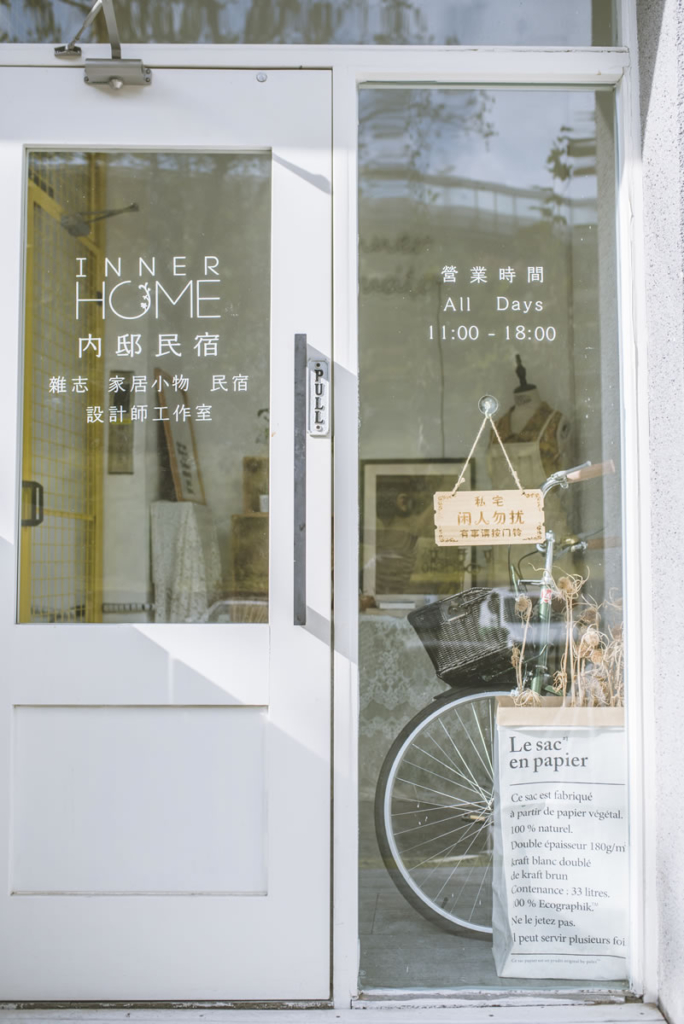
9. What do you hope to accomplish with the hostel?
My wish is to use the funds generated from the hostel to help me realize my design dreams. A good design product requires a lot more distribution and promotion. I can’t do it alone. I hope to gather more resources to develop “Inner Home”, hah!
10. Any future plans?
To open a hostel in Beijing. Not just a hostel, but a multi-purpose space that includes a hostel, cafe, the clothes that I design, and household products. The future is still far away, so I need to make the first step. Opening a hostel is only just the beginning.
InnerHome品牌公眾號/Wechat Official Account: InnerHome工作室 (id:inner_home)
青島民宿預訂客服微信/Qingdao hostel booking Wechat:innerhome_qd
Airbnb:https://zh.airbnb.com/users/24825788/listings
青島民宿照片 攝影師/Qingdao hostel photographer:周軍 Zhou Jun
青島民宿插畫/Qingdao hostel illustrator:又右 Youyou
北京民宿照片/Beijing hostel photographer :PC House
